#west african heritage
Photo

“Sisters in Culture,” Emancipation Day, Tobago Heritage Festival, Tobago 2019
#Trinidad and Tobago#Tobago#Emancipation Day#Tobago Heritage Festival#Caribbean#West Indies#West Indian#African Diaspora#culture#2019#2010s#Sisters in Culture
93 notes
·
View notes
Text
Kwaku Basis
#ttte#ttte kwaku#kwaku#my polls#random polls#polls#tumblr polls#tumblr poll#poll time#polls on tumblr#saw someone on Twitter make him a Tasmanian k class and another person on da made him a South African NG16 and I know Garratt are common in#Africa which I’m inspired by and considering Nia is also a South African loco in my au but had parts exported from Kenya 🇰🇪 maybe the same#For kwaku maybe he could be based off the kur/ear like gosh I love him even though he barely had any screen time also I found out his name#comes from the Akan/ewe people who primarily live in west Africa like Ghana 🇬🇭 togo 🇹🇬 Ivory Coast 🇨🇮 and maybe he was named after#someone but like yeah maybe I’m overthinking this but kwaku is narrow gauge in my au btw he works at the cronk and harwick heritage railway
4 notes
·
View notes
Text

Illustration photo: Maize kernels being processed for food manufacturing (public domain)
Unveiling the Treasure of West Africa: Maize Grains from Sahel Agri-Sol
July 5, 2024
In the heart of West Africa, where the fertile lands of Mali stretch under the warm African sun, Sahel Agri-Sol cultivates nature's bounty - maize grains that stand unrivaled in quality, flavor, and versatility. As a leading producer and exporter of agricultural commodities, we invite food and cosmetics manufacturers worldwide to discover the transformative power of our exceptional corn.
A Legacy of Excellence
Sahel Agri-Sol's story is deeply rooted in the rich agricultural tradition of Mali. For generations, our farmers have nurtured the land, combining time-honored techniques with modern sustainable practices. This unique approach results in maize grains that not only meet but exceed global standards, offering a product that's truly special in today's market.
For Food Manufacturers: Elevate Your Culinary Creations
Flavor Profile
Our maize grains boast a robust, slightly sweet flavor with nutty undertones - a testament to the unique terroir of West Africa. This distinctive taste can add depth and character to a wide range of food products, setting your offerings apart in a competitive market.
Versatility
From traditional cornmeal and polenta to innovative snack foods and gourmet popcorn, our maize adapts beautifully to diverse applications. Its superior texture and consistent quality make it ideal for:
Nutritional Excellence
Packed with essential nutrients, our maize is a powerhouse of:
For Cosmetics Manufacturers: Nature's Beauty Secret Unveiled
Innovative Ingredients
Unlock the potential of maize in your cosmetic formulations:
1. Corn Silk Extract: Rich in antioxidants, it offers anti-aging and skin-soothing properties.
2. Corn Oil: A lightweight, non-comedogenic oil perfect for moisturizers and hair care products.
3. Corn Starch: An excellent natural absorbent for powders and dry shampoos.
4. Microfine Cornmeal: Gentle exfoliant for body scrubs and facial cleansers.
Eco-Friendly Appeal
In an era where consumers demand natural, sustainable beauty solutions, our maize-derived ingredients offer a compelling narrative. Highlight the purity and origin of your ingredients, connecting your brand to the vibrant agricultural heritage of West Africa.
The Sahel Agri-Sol Advantage
1. Sustainable Cultivation
Our farms employ a blend of traditional wisdom and modern eco-friendly practices, ensuring minimal environmental impact while maximizing yield and quality.
2. Rigorous Quality Control
From seed selection to harvest and processing, every step is meticulously monitored. Our state-of-the-art facilities and stringent testing protocols guarantee purity, consistency, and safety.
3. Flexible Solutions
Whether you need bulk shipments or smaller quantities, we offer customizable packaging options to suit your specific requirements.
4. Year-Round Availability
Our strategic planning and extensive storage facilities ensure a stable supply throughout the year, protecting your production schedules from seasonal fluctuations.
5. Competitive Edge
By choosing Sahel Agri-Sol, you're not just buying superior maize - you're investing in a story of sustainability, tradition, and quality that resonates with today's conscious consumers.
6. Support and Expertise
Our team of agricultural experts and customer service professionals is always ready to assist you, from product selection to logistics support.
Global Reach, Local Impact
By partnering with Sahel Agri-Sol, you're not only elevating your products but also supporting sustainable agricultural practices and contributing to the economic development of West African communities.
Experience the Sahel Agri-Sol Difference
We invite you to discover the unparalleled quality of our West African maize. Contact us today to request samples, discuss your specific needs, or arrange a visit to our facilities in Mali. Let's explore how Sahel Agri-Sol's premium maize grains can revolutionize your product line and captivate your customers.
Bring the golden essence of West Africa to your global products. Choose Sahel Agri-Sol - where quality meets tradition, and innovation embraces nature.
Sahel Agri-Sol
Hamdallaye ACI 2 000,
« BAMA » building 5th floor APT 7
Bamako
Mali
Phone: +223 20 22 75 77
Mobile: +223 70 63 63 23, +223 65 45 38 38
WhatsApp/Telegram global marketing and sales: +223 90 99 1099
Email: [email protected]
Web sites
English https://sahelagrisol.com/en
Français https://sahelagrisol.com/fr
Español https://sahelagrisol.com/es
简体中文 https://sahelagrisol.com/zh
عربي https://sahelagrisol.com/ar
More
#West African maize#premium corn#Mali agriculture#food manufacturing ingredients#cosmetics natural ingredients#sustainable farming#global export#premium grains#traceable supply chain#nutritional corn#corn-based cosmetics#eco-friendly ingredients#innovative food products#African agricultural heritage#customizable solutions#year-round availability#quality control#traditional farming techniques#modern agricultural practices#economic development#conscious consumerism#versatile corn applications#gourmet corn products#maize-derived beauty ingredients#global food industry#international cosmetics market#agricultural commodities#exotic ingredients#culinary innovation
1 note
·
View note
Text





#heritage#retention#migrations#language#culture#africans#west afircans#brazil#america#roots#diaspora
0 notes
Text
Exploring the Rich History of the Soninke People in Mali
Unveiling the Fascinating Soninke People of West Africa
The Soninke people are an ethnic group with a rich cultural heritage deeply intertwined with the history of West Africa. This article delves into the fascinating world of the Soninke, exploring their origins, traditions, and the significant impact they had on the development of empires in the region. Whether you’re a history buff, an…
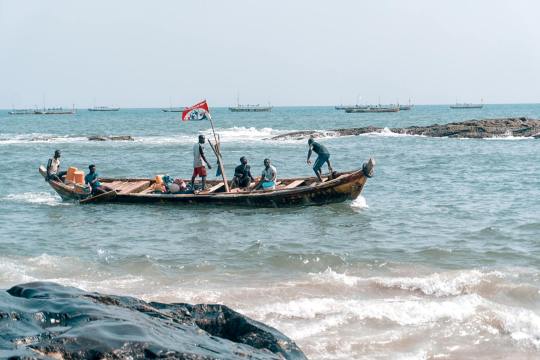
View On WordPress
#Cultural Diversity#Cultural Heritage#Cultural Influences#Cultural Tapestry#Ethnic Groups#Ghana Empire#Historical Significance#inclusivity#Interpretation Services#Language Access#Language Services#LanguageXS#Mande Language#Soninke Diaspora#Soninke Language#Soninke People#West Africa#West African Traditions
1 note
·
View note
Text
Tales Episode 23: Garfield Moore
Tales From the Jazz Side with cellist/composer/educator Garfield Moore.
I have known Mr. Moore for quite some time and have had the privilege to perform with him on only one occasion. And that one time, the plethora of knowledge that I gained in that interaction still sits with me today as I progress into new territories of music. Where do I start with the history of this fascinating and…
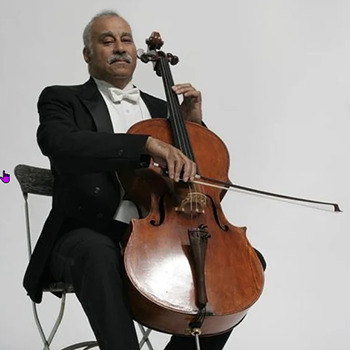
View On WordPress
#african american classical music#Alvin Ailey Ballet#Bach#Boccherinin#classical cello#classical music#Dvorak#Ibert#Musical Heritage Society#Opera Ebony#Pacific Philharmonic#Santa Cruz Symphony#Universal Chamber Orchestra#West End Symphony
0 notes
Text
“Across cultures, darker people suffer most. Why?” Multiethnic and Multicultural Blackness
“Across cultures, darker people suffer most. Why?”- Andre 3000
Tell me what's wrong with this picture.

Hint: This is Miles Morales- from the video game depiction- canonically an Afro-Puerto Rican. Jefferson is Black American; Rio is Puerto Rican.
So why is the Cuban flag on their wall?
This is what happens when no one (with any saying power) in the board room is representative of the group being depicted! And mind you, this was produced under SONY and MARVEL, for the PS5, a product under two brands that combined churn out hundreds of millions in profit! And… No one on any level corrected them until the beta came out and fans saw it. That's how pervasive this sort of ignorance of other cultures can be. How are you writing a story about a character, and you don't even know how he identifies?
Multiethnic & Multicultural Blackness
Realistically, you’ve probably walked past many a biracial, multicultural, or multiethnic Black person before and assumed they were “just Black”. One example: Rae Dawn Chong- known as Mama du Pointe du Lac- is Afro-Chinese, but that Chinese background did not play into the role she played. A more personal example: my recent loctician was also Afro-Chinese, with very dark skin (she made jokes about how her eyes reveal it, but we can’t make those jokes here). I would have never known.
Point is, we reacted to what we saw, and that’s not an accident. Blackness is treated as a monolith, and an indicator of social level whether you realize it or not. You see a ‘Black’ person, and without wondering any further about their identity, you will treat them as you’ve been socialized to treat ‘Black’ people! But every Black person is not the same!
You don't have to write an entire essay with citations mid-story about how you learned so much about the Afro-Chicana or Afro-Iraqi experience for your main character. We didn't ask. But, slipping natural things here and there into the story of a character’s culture helps cement that yes, this character has this multicultural identity and it matters to them; it is who they are, it has an effect on their life and character in some way. It is how you deepen the character and show respect for the culture you are depicting!
I love using Miles as an example, so here’s a good example. In Across The Spiderverse, he goes to a party to celebrate Jefferson’s new position. In that scene, Rio walks through a mix of all his family members. Even when he speaks with his parents in this scene, they managed to incorporate his Afro-Puerto Rican identity without shouting to the rooftops “HEY! HE’S BLACK AND LATINO! SEE HOW I’M TELLING YOU?”
Race vs Ethnicity
The Black experience stretches as far as the African diaspora- worldwide! It's why it's frustrating when people assume "Black people" means "United States" and the West's perception of "Third World Africa" (especially when it comes to existing in media that people have strongly claimed is just White). Latin and Central America? West Europe? East Europe? Southwest Asia and North Africa? The Mediterranean? East Asia? Australia? You will find Black people!! Just because we aren't the majority doesn't mean we aren't there!
But just because we're Black doesn't mean we're all "African-American". Ethnicity is "the quality or fact of belonging to a population group or subgroup made up of people who share a common cultural background or descent." Race is "a categorization of humans based on shared physical or social qualities into groups generally viewed as distinct within a given society."
"But I thought you said Black is an identity!"
It is! Black does not only mean “Black American”. The reason Black Americans identify as just Black (which is why I demand that you show respect by capitalizing it) is due to the loss of our specific heritages from the enslavement meant to scourge us of them, to make us property. To call us by our actual names would be acknowledging our equivalent humanity and culture. In order to enforce slavery without qualm, they had to be violently removed. Black Africans of numerous ethnic groups, now violently forced into this amalgamation, had to come together and forge something new. We had to find a common connection- our Blackness (and that experience as defined by whiteness in this society) was it. It also functions as a reclamation of our identity, of our presence in this world. We are a culture, we are an entire group of people, and we should be acknowledged as such.
youtube
Again: all Black people are NOT the same!!! This is like… anti-racism 101, but so many people continue to fall for it, even those ‘well-meaning’. You cannot ask one Black person to represent the ENTIRETY of the world's Black experience. Many other factors will come into play, and this includes their culture.
Keep in mind how being multicultural and/or biracial and Black will put many people at a crossroads that is complex and difficult to traverse. There will always be parts of incomplete acceptance, an extra layer of code-switching based on where you are and who you're with. A Black Kenyan is not a Black American, who is not a Black Greek, who is not a Black Colombian, who is not a Black Filipino. They're different cultures, that will treat each other differently. Society- from strangers to your own family- may try to pull multiethnic Black people one direction or another- are you ‘Black’ enough, are you ‘technically Black’, are you ‘technically’ something else, are you that ethnicity enough?
(I will discuss Black biracial people with whiteness in the next lesson, because I felt like the interracial and biracial White & Black topic needed its own talk, but this is relevant there as well.)
Where- In the world- Is-
Coming back from the opening of this lesson: keep in mind that you need to know specifically WHERE your character is from! For example, just saying they're "Afro-Latino" reveals very little- there's an entire chunk of the planet that falls under the "Latin America" category (as defined by U.S. standards).
A follower of mine- they identify as Caribbean Latine- sent me this in discussion about the topic:
"I wish people actually thought about where their Afro-Latino characters are from. It’s always very vague and it’s so reductive because an Argentinian Afro-Latino is very different from a Puerto Rican Afro-Latino. This is very subjective but I think this issue is pretty blatant in The Owl House. They flash the Dominican flag a couple of times, but when it comes to actually making her Afro-Latino…I don’t think they did a very good job. They barely made her Black in the first place. I don’t want to dog on the voice actors too much because there are a million factors that might have affected this but. When they make a point to have the characters speak Spanish, it’s really noticeable when the accent/dialect doesn’t align with their ethnicity. Dominicans have a really identifiable dialect in Spanish. When the Afro-Latino characters speak in Spanish, it’s the most neutral accent I’ve ever heard. This is such a me-issue, but this is to say that people should actually research where their characters are from instead of vaguely painting them as Afro-Latino. We are all SOOO different. Our dialects vary so much that sometimes an Afro-Mexican and an Afro-Puerto Rican won’t understand each other even though we speak the same language.”
WHO are we talking about? How does that factor into their identity, and the way the world- both in story, and how readers from around the world- will perceive them? Will an Afro-Dominican know that they're supposed to relate to your character if they're vaguely Latino?
Note:
While I was doing my research, I noticed that searching for “Afro-_” doesn’t always offer much, as it does the ubiquitous antiblack experience and roles in politics and resistance. And while I think that’s super cool and mandatory, I think another way to approach this would be to focus on the culture as a whole, and then go from there. So for example, if I wanted my character to be Afro-Mexican- maybe even from a specific location in Mexico, or their family is from that area- it would be easier to look up the cultures and activities of that area itself, and then inform with my knowledge of how Blackness is treated there.
As I am not a member of these groups, I thought it would be better for me to find resources that better explain, than to try to speak for them myself. Hell, just from doing this research, I learned that I have far more to educate myself on. There are so many good resources out there! People speak on these topics that y’all want to know about, and there are so many books and videos- find them and educate yourselves! This is a long section filled with links, so I'm going to put them under a readmore.
I also could not possibly sit here and name every single ethnic combo because that would be endless. So what I'm going to do is give some broad strokes of a few major groupings, that will hopefully start you on the path of how to conduct your own research!
The African Diaspora
This is such a good resource. There are short chapters going into the details and history of Black people in many regions, all around the globe. I’m honestly in love with how this is set up. It's a good starting point!
Black Africans

This one isn't specifically an example of multiethnicity; I just want to emphasize that there are many ethnicities and cultures within Africa itself! One is still multiethnic if they are Black American and Ivorian, for example! As the birthplace of humanity, there are plenty of ethnic groups in Africa with endlessly rich cultures, and all of them will come with different foods, fashions, languages!
Notable Figures: Nelson Mandela, Tobi Lou, Patrice Lumumba, Tems, Wizkid, Kwame Nkrumah, Chinua Achebe, Chimamanda Ngozi Adichie, Wangarĩ Maathai, Agnes Tirop, Chéri Samba, Sheikh Abdullah Ssekimwanyi
Internalized antiblackness in African countries is due to the long and violent history of western imperialism in Africa. “The Carving Up of Africa” by European nations has long worn on the continent, its resources, and its peoples, and that includes remnants of their beliefs. Another pervasive idea in media is that all African peoples are ‘poor’, ‘living in huts’, and ‘starving’. There are people doing that all over the world, it is not inherent to being Black African. But even if that were the case- and it is not, every African does not live that way- it would still be the fault of aforementioned imperialism. Please do your research, and do not EVER write that if someone is African, they ‘must not be used to food’ or ‘have never seen such magnificent things as [what white character offers]’.
Afro Latinos

Notable figures: Celia Cruz, Frantz Fanon, Zoe Saldaña, Colman Domingo, Lupita Nyongo, Gina Torres, Cardi B, MJ Rodriguez
Notable music styles- Reggaeton? Salsa? Rumba? A lot of the best music of the area has roots in Blackness.
Antiblackness in the Afro-Latino community
Colorism plays a huge role in perception, to the point of putting you into classes of people. From the same Caribbean Latine follower:
Also, they have to do research on racial groupings in LATAM. It’s unavoidable. A Latino that’s considered Black in the USA may not be considered Black in LATAM. This is because of Blanqueamiento. That is a LOT to explain, but TLDR: A big difference between racism in the USA and racism in LATAM is that white people aren’t focused on segregation. It’s racism through imposition. “Blanqueamiento” refers to whitening and it’s the belief that you can cleanse the bloodline by having children with white people. The lineage will get increasingly lighter. That is why whenever a child comes out lighter than their parents, people will praise the parents for “bettering the race” (mejorando la raza). So a light skinned Black person in the USA may have another racial classification in LATAM (prieto, moreno, mulato, etc)."
One example is 'pelo malo' (bad hair)- how afro-textures are deemed unwanted, as a holdover from Spanish colonization and ideas of whiteness being equivalent to purity. Another severe example is of the slur "mayate"- apparently, it means "f*ggot black bug". If you're Black, and someone ever calls you this, know that you are being severely insulted. If you are interested in more Afro-Mexican history, Colonial Blackness by Herman Bennett is a book that follows the stories of enslaved Africans and their descendants in 17th century Mexico, questioning the existing history told that often leaves out their presence.
Afro Indigenous

*Indigenous doesn't just mean "to America", though the links are to the Afro-indigenous experience in the U.S.
Notable Figures: Crispus Attucks, Lucy Parsons, George Henry White, Charlie Patton, Jimi Hendrix, Eartha Kitt, Lena Horne, Ausben Jordan
What’s interesting is that it was much harder for me to find solid evidence of people who are Black Natives, mainly because it seems this history was lost and/or never recorded, or due to Blood Quantum and antiblackness, not acknowledged. That is something worth thinking about, if you are writing an Afro-Native character.
Blood quantum: A system developed by the United States federal government to determine how much “Indian blood” an Indigenous person has and if they are qualified for Tribal enrollment. Blood quantum limits accessibility to citizenship and is designed to decrease enrollment numbers. Today, some tribes still use blood quantum as criteria for Tribal enrollment. As part of their sovereign status, every federally recognized Tribe determines its own criteria for membership and enrollment.
Further reading:
Young, Black Native activists say it's time to appreciate Indigenous diversity
Black Indians: A Hidden Heritage
Blood Politics: Race, Culture, and Identity in the Cherokee Nation of Oklahoma By Circe Sturm (2002)
We Refuse to Forget: A True Story of Black Creeks, American Identity, and Power By Caleb Gayle (2023)
Afro-Arab/SWANA

Notable figures: Bilal ibn Rabah, Fatima Bernawi, Layla F. Saad, Samirah Srur Fadel, Ahmed Osman, Sara El Hassan (known as bsonblast), Ali Jiddah, Maryam Abu Khaled
Here's an amazing resource cataloguing the history of Afro-Palestinians, as well as a timeline of the solidarity between Black Americans, Afro-Palestinians, and Palestinians!
I sat here and tried very hard to come up with a way to summarize this, especially given current events in our world, and I found that at this moment, I lack the skill to do it. Not because there’s nothing to say- God knows there’s plenty- but unraveling the intersections that comes with the SWANA experience would take me far longer than a summary. I think Maryam Abu Khaled can speak on her experience far better than I, anyway:
youtube
Afro-AAPI

Notable figures: apl.de.ap, Michael Ealy, H.E.R., Karrueche, Rae Dawn Chong, Naomi Campbell, Naomi Osaka, Chanel Iman, Anderson Paak
Interview from famous R&B artist, guitarist, actress for Belle, and Afro-Filipina: H.E.R.
There is a strain between Black and Asian communities, in the United States and beyond, white supremacy playing a major role. But that does not mean that we cannot move forward together, or have not shown one another solidarity.
One of my biggest pet peeves that happens often in fandom spaces is fans who claim that Asians- East Asians in particular, but Asians in general- don't know what Black people are and what we look like. It's racist to every ethnicity and background involved. Yes, there are Black East Asian and Black South Asian people. Yes, these countries have access to the Internet to look up what we look like. There have been plenty of well-drawn Black people by those artists. Just like every white artist isn't going to draw a caricature, every Asian artist isn't going to. It all comes down to practice, their commitment to their craft, and their commitment to not being racist. Being from these areas is not an excuse for not drawing Black people accurately- the same amount of effort they can be put into depicting a white person (that would also be a minority in these places), can be put into depicting us as well. Knock it off.
Conclusion
Antiblackness is unfortunately ubiquitous, yes, but that doesn’t mean the rest of every Black person’s life experience is going to be. We are everywhere on this planet, which means there’s a planet’s worth of experiences to be had. If you decide that you want to create a Black character with a multiethnic or multicultural background, you need to commit to that! Even by mentioning their music, or their food, or- if you’re going to get into it- how others might treat them due to their Afro-identity. Something that lets us as the viewers know that you didn’t just write a white person and then claim they were “Afro-Blank” for clout. If you mean it, do it, because as always, it’s the thought that counts, but the action that delivers!
#there are a lot of links in this one#creatingblackcharacters#multiethnic#multicultural#the black experience#black character design#antiracism#colonialism#representation
1K notes
·
View notes
Note
- Sephardi Jew here. Thank you for your posts concerning Palestinian Jews. Jewish people who are ethnically North African/West Asian are consistently left out of these conversations. Make no mistake - the word "Mizrahi" was invented by Israel to literally strip Palestinian Jews of their identities during the beginning of the occupation. The message was to either assimilate with the Ashkenazi, or die as a Palestinian. The entire reason people struggle to find resources about the history of Palestinian Jews is because it has been purposefully obscured by the occupation. While I am not Palestinian, (that I know of, the other funny thing, diaspora members of the Sephari community often have trouble pinning down our exact heritage, I'll let you guess why) my ethnic background is Moroccan, Libyan, Maltese. Jews from the Iberian Peninsula and Mediterranean Sea have always been here, will continue to be here. You don't have to answer this publicly or anything, btw, I just really try to reach out to people who elevate the voices of the Jewish people from this area of the world. It profoundly touches my heart.
of course, no need to thank me. an aspect of the occupation is a lot of palestinian jews have been erased from palestinian history which is pretty heartbreaking as someone who makes it their lifegoal to preserve palestinian cultural heritage and spread it to people.
it is really difficult finding resources on jewish history in SWANA before it was touched by the occupation despite it being a fundamental part of swana history.... and part of that is from european colonialism and the other part of it is collaboration with european colonialists and swana governments.
if anyone has sources on swana jewish history (i know of hadar cohen and avi shlaim rn), please do let me know so i can look into it!!
3K notes
·
View notes
Text
Once you call yourself a Negro, the scientifically written you out of existence. There is no land called Negro, no language or culture- Malcolm X

Right now, in this country, if you and I, 22 million African-Americans -- that's what we are -- Africans who are in America. You're nothing but Africans. Nothing but Africans. In fact, you'd get farther calling yourself African instead of Negro.

Black names don't exist, black land does not exist, black language does not exist. Human skin comes from the darkest brown to the lightest hues. We are Africans. African populations have the highest levels of genetic variation among all humans.- Khepri Neteru

By the early 1900s, nigger had become a pejorative word in the United States. In its stead, the term colored became the mainstream alternative to negro and its derived terms. After the American Civil Rights Movement, the terms colored and negrogave way to "black". Negro had superseded colored as the most polite word for African Americans at a time when black was considered more offensive.[126][failed verification] This term was accepted as normal, including by people classified as Negroes, until the later Civil Rights movement in the late 1960s. One well-known example is the use by Dr. Rev. Martin Luther King Jr. of "Negro" in his famous speech of 1963, I Have a Dream. During the American civil rights movement of the 1950s and 1960s, some African-American leaders in the United States, notably Malcolm X, objected to the word Negrobecause they associated it with the long history of slavery, segregation, and discrimination that treated African Americans as second-class citizens, or worse.[127] Malcolm X preferred Black to Negro, but later gradually abandoned that as well for Afro-American after leaving the Nation of Islam.[128]
Since the late 1960s, various other terms for African Americans have been more widespread in popular usage. Aside from black American, these include Afro-American (in use from the late 1960s to 1990) and African American (used in the United States to refer to Black Americans, people often referred to in the past as American Negroes).[129]
In the first 200 years that black people were in the United States, they primarily identified themselves by their specific ethnic group (closely allied to language) and not by skin color. Individuals identified themselves, for example, as Ashanti, Igbo, Bakongo, or Wolof. However, when the first captives were brought to the Americas, they were often combined with other groups from West Africa, and individual ethnic affiliations were not generally acknowledged by English colonists. In areas of the Upper South, different ethnic groups were brought together. This is significant as the captives came from a vast geographic region: the West African coastline stretching from Senegal to Angola and in some cases from the south-east coast such as Mozambique. A new African-American identity and culture was born that incorporated elements of the various ethnic groups and of European cultural heritage, resulting in fusions such as the Black church and African-American English. This new identity was based on provenance and slave status rather than membership in any one ethnic group.
By contrast, slave records from Louisiana show that the French and Spanish colonists recorded more complete identities of the West Africans, including ethnicities and given tribal names.
The U.S. racial or ethnic classification "black" refers to people with all possible kinds of skin pigmentation, from the darkest through to the very lightest skin colors, including albinos, if they are believed by others to have African ancestry (in any discernible percentage). There are also certain cultural traits associated with being "African American", a term used effectively as a synonym for "black person" within the United States

#african#afrakan#kemetic dreams#africans#brownskin#brown skin#afrakans#african culture#Malcolm x#african ancestry#igbo#ashanti#bakongo#americas#epic video#middle class negro documentary
205 notes
·
View notes
Text
Most Afro-Palestinians in this tight-knit community came to the region as religious pilgrims during the British Mandate for Palestine, and many have been part of the Palestinian resistance movement since Israel’s establishment in 1948. Others arrived as volunteers with the Egyptian army to fight against Zionist militias taking control of historic Palestine during the Arab-Israeli war.
The community has played a pivotal role in the history of Palestinian resistance. Locals say that the first Palestinian woman to be imprisoned for a paramilitary operation against Israel was Fatima Barnawi, a Nigerian-Palestinian detained in 1967 for the attempted bombing of an Israeli cinema in West Jerusalem.
Yet decades later, Afro-Palestinian youth continue to live their daily lives under Israeli control.
At just 17, Abdallah’s cousin, Jibrin, has already been detained five times by Israeli forces, mostly over allegations that he threw stones at Israeli police and military officers. While he and his friends face the same harassment as other Palestinians, he said, they sometimes experience “double-racism” for both being Palestinian and having dark skin.
“The soldiers are always cursing at me and interrogating me when I pass them. They try to provoke me so that I do something they could get me in trouble for,” Jibrin told Al Jazeera, noting that he has been beaten several times by Israeli police and soldiers during detentions.
“Most of those in my generation have the same experiences,” he added with a shrug. “It’s routine.”
#free palestine#palestinian prisoners' day#genocide#antiblackness#prison abolition#police abolition#abolition#zionist colonization#settler colony of israel
306 notes
·
View notes
Text
Title: "The Significance and Diversity of African Names"
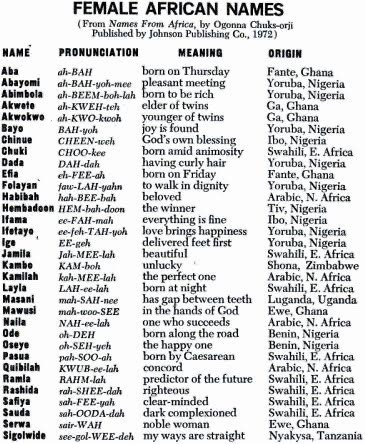
Introduction
African names are a reflection of the continent's incredible diversity, culture, history, and traditions. With over 2,000 distinct languages spoken and a multitude of ethnic groups, Africa is a treasure trove of names that carry deep meanings and unique stories. In this article, we'll explore the rich tapestry of African names, their significance, and the cultural diversity they represent.
The Importance of Names
Names hold a special place in African societies. They are more than mere labels; they encapsulate a person's identity, heritage, and often convey messages of hope, aspiration, and blessings. African names are deeply rooted in the belief that a name can shape a person's destiny and character.
Linguistic Diversity
Africa's linguistic diversity is astounding, with thousands of languages spoken across the continent. Each language group has its distinct naming traditions, resulting in a vast array of names. For example, in West Africa, Akan names such as "Kwame" (born on a Saturday) and "Kofi" (born on a Friday) are common, while in East Africa, Swahili names like "Amina" (trustworthy) and "Nia" (purpose) are prevalent.
Meanings and Symbolism
African names are rich in meaning and symbolism, often reflecting the circumstances of a child's birth, their family history, or the aspirations of their parents. Names can signify virtues like courage, strength, and wisdom or convey hopes for a prosperous and fulfilling life.
Family and Heritage
In many African cultures, names are chosen to honor ancestors, celebrate cultural heritage, or connect the child to their roots. This practice ensures that generations remain connected to their family's history and traditions. For example, the Igbo people of Nigeria often use "Ngozi" (blessing) to convey the hope for a blessed life..
Naming Ceremonies
Naming ceremonies are significant events in many African communities. These ceremonies are joyous occasions where family and friends gather to celebrate the birth of a child and bestow a name. The rituals and customs associated with these ceremonies vary widely, showcasing the diversity of African naming traditions.
Modern Influences
In today's globalized world, African names are not confined to the continent. Many people of African descent living outside Africa proudly bear African names, celebrating their cultural heritage and contributing to the global recognition of the beauty and significance of these names.
Conclusion
African names are a testament to the continent's diversity, culture, and history. They carry profound meanings, connect individuals to their heritage, and celebrate virtues and aspirations. As we embrace and appreciate the beauty of African names, we also acknowledge the importance of preserving and passing on these cultural treasures to future generations, ensuring that the rich tapestry of African identity remains vibrant and thriving.
1. **Kwame (Akan, Ghana):** A male name meaning "born on a Saturday."
2. **Ngozi (Igbo, Nigeria):** A unisex name meaning "blessing" or "good fortune."
3. **Lulendo (Lingala, Congo):** A male name meaning "patient" or "tolerant."
4. **Amina (Swahili, East Africa):** A female name meaning "trustworthy" or "faithful."
5. **Kwesi (Akan, Ghana):** A male name meaning "born on a Sunday."
6. **Nia (Swahili, East Africa):** A unisex name meaning "purpose" or "intention."
7. **Chinwe (Igbo, Nigeria):** A female name meaning "God owns" or "God's own."
8. **Mandla (Zulu, South Africa):** A male name meaning "strength" or "power."
9. **Fatoumata (Wolof, Senegal):** A female name meaning "the great woman."
10. **Kofi (Akan, Ghana):** A male name meaning "born on a Friday."
These are just a few examples, and there are countless other African names with unique meanings and significance. It's essential to remember that Africa is incredibly diverse, and each region and ethnic group has its own naming traditions and languages, contributing to the rich tapestry of African names.
The most popular African names among Black Americans can vary widely based on individual preferences, family traditions, and regional influences. Many Black Americans choose names that connect them to their African heritage and celebrate their cultural roots. Here are a few African names that have been embraced by some Black Americans:
1. **Malik:** This name has Arabic and African origins and means "king" or "ruler."
2. **Amina:** A name of Swahili origin, meaning "trustworthy" or "faithful."
3. **Kwame:** Derived from Akan culture, it means "born on a Saturday."
4. **Nia:** A Swahili name representing "purpose" or "intention."
5. **Imani:** Of Swahili origin, it means "faith" or "belief."
6. **Jamal:** This name has Arabic and African roots and means "handsome."
7. **Ade:** A Yoruba name meaning "crown" or "royalty."
8. **Zuri:** Of Swahili origin, it means "beautiful."
9. **Sekou:** Derived from West African languages, it means "fighter" or "warrior."
10. **Nala:** This name is of African origin and means "gift."
It's important to note that while these names have African origins, their popularity among Black Americans can vary by region and individual choice. Additionally, some Black Americans choose to create unique or hybrid names that blend African and American influences, reflecting their personal and cultural identities. The naming choices among Black Americans are diverse and reflect the rich tapestry of their heritage and experiences.
African Languages: A Tapestry of Diversity and Culture"
Introduction
Africa is a continent known for its stunning natural landscapes, diverse wildlife, and rich cultural heritage. Among its many treasures, the continent boasts an astonishing linguistic diversity that is often overlooked. In this article, we delve into the fascinating world of African languages, exploring their diversity, cultural significance, and the challenges they face in a rapidly changing world.
The Linguistic Kaleidoscope
Africa is home to over 2,000 distinct languages, making it one of the most linguistically diverse regions on the planet. These languages belong to several different language families, including Afroasiatic, Nilo-Saharan, Niger-Congo, and Khoisan, each with its unique characteristics.
Niger-Congo Family: The vast majority of African languages, including Swahili, Yoruba, Zulu, and Kikuyu, belong to the Niger-Congo language family. This family stretches across West, Central, and Southern Africa, reflecting the continent's linguistic richness.
Afroasiatic Languages: Arabic, a member of the Afroasiatic family, has a significant presence in North Africa, while other Afroasiatic languages like Amharic are spoken in the Horn of Africa.
Nilo-Saharan Languages: Found in parts of East and North Central Africa, Nilo-Saharan languages include Dinka, Kanuri, and Nubian.
Khoisan Languages: These languages, characterized by their unique click consonants, are primarily spoken by indigenous groups in Southern Africa, such as the San and Khoi people.
Cultural Significance
African languages are not just tools of communication; they are repositories of cultural heritage and identity. They carry the history, stories, and traditions of their speakers. Each language is a key to unlocking the rich tapestry of African cultures, from oral storytelling and folklore to religious rituals and traditional medicine
Preserving Cultural Diversity
Despite their cultural importance, many African languages are endangered. The rise of global languages like English, French, and Portuguese, often due to colonial legacies, has led to the decline of indigenous languages. To address this, efforts are being made to document, preserve, and revitalize endangered African languages through education, community initiatives, and technology.
A Language of Unity
In some regions, African languages are a means of fostering unity. For example, Swahili, a Bantu language with Arabic influences, serves as a lingua franca in East Africa, promoting communication and cooperation among diverse ethnic groups.
Challenges and Opportunities
While African languages face challenges in an increasingly interconnected world, they also offer unique opportunities. Embracing linguistic diversity can strengthen cultural identities, promote inclusive education, and drive economic growth through multilingualism.
Conclusion
African languages are an integral part of the continent's rich heritage and cultural tapestry. They represent the diversity of Africa's peoples and their traditions. While challenges exist, there is hope that efforts to preserve and celebrate these languages will ensure that they continue to thrive, enriching the world with their unique beauty and significance. In an increasingly globalized world, Africa's linguistic diversity is a testament to the resilience and vibrancy of its cultures.
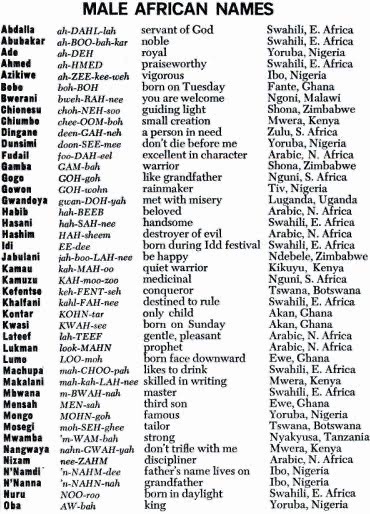
#life#animals#culture#aesthetic#black history#history#blm blacklivesmatter#anime and manga#architecture#black community#language
712 notes
·
View notes
Text
I just watched a tiktok of Will Poulter talking about the lack of fine dining restaurants specializing in African cuisines, and how only 4 Michelin stars have ever been held by Black chefs. I feel like this fact would be such an interesting addition to the Sydney wants a star plot line and considering how their first menu drew so heavily on Carm’s Italian culture it would be nice to see a future menu drawing from Syd’s Nigerian/west African heritage.
395 notes
·
View notes
Text
Kwanzaa:
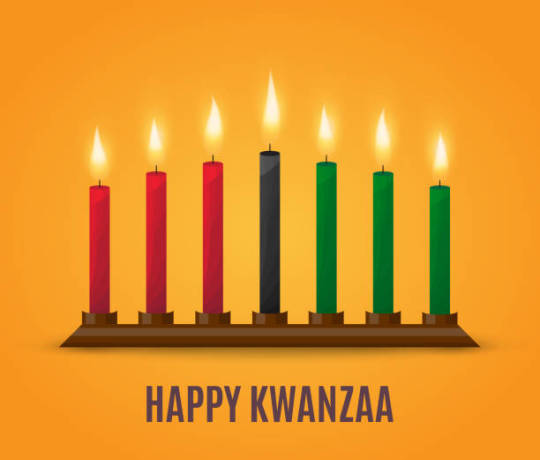
Kwanzaa, an annual holiday celebrated primarily in the United States from December 26 to January 1, emphasizes the importance of pan-African family and social values. It was devised in 1966 by Maulana Karenga, Inspired by Africa’s harvest celebrations, he decided to develop a nonreligious holiday that would stress the importance of family and community while giving African Americans an opportunity to explore their African identities. Kwanzaa arose from the black nationalist movement of the 1960s and was created to help African Americans reconnect with their African cultural and historical heritage. The holiday honors African American people, their struggles in the United States, their heritage, and their culture. Kwanzaa's practices and symbolism are deeply rooted in African traditions and emphasize community, family, and cultural pride. It's a time for reflection, celebration, and the nurturing of cultural identity within the African American community.
Kwanzaa is a blend of various African cultures, reflecting the experience of many African Americans who cannot trace their exact origins; thus, it is not specific to any one African culture or region. The inclusiveness of Kwanzaa allows for a broader celebration of African heritage and identity.
Karenga created Kwanzaa during the aftermath of the Watts riots as a non-Christian, specifically African-American, holiday. His goal was to give black people an alternative to Christmas and an opportunity to celebrate themselves and their history, rather than imitating the practices of the dominant society. The name Kwanzaa derives from the Swahili phrase "matunda ya kwanza," meaning "first fruits," and is based on African harvest festival traditions from various parts of West and Southeast Africa. The holiday was first celebrated in 1966.
Each day of Kwanzaa is dedicated to one of the seven principles (Nguzo Saba), which are central values of African culture that contribute to building and reinforcing community among African Americans. These principles include Umoja (Unity), Kujichagulia (Self-Determination), Ujima (Collective Work and Responsibility), Ujamaa (Cooperative Economics), Nia (Purpose), Kuumba (Creativity), and Imani (Faith). Each family celebrates Kwanzaa in its own way, but Celebrations often include songs, dances, African drums, storytelling, poetry readings, and a large traditional meal. The holiday concludes with a communal feast called Karamu, usually held on the sixth day.
Kwanzaa is more than just a celebration; it's a spiritual journey to heal, explore, and learn from African heritage. The holiday emphasizes the importance of community and the role of children, who are considered seed bearers of cultural values and practices for the next generation. Kwanzaa is not just a holiday; it's a period of introspection and celebration of African-American identity and culture, allowing for a deeper understanding and appreciation of ancestral roots. This celebration is a testament to the resilience and enduring spirit of the African-American community.
"Kwanzaa," Encyclopaedia Britannica, last modified December 23, 2023, https://www.britannica.com/topic/Kwanzaa.
"Kwanzaa - Meaning, Candles & Principles," HISTORY, accessed December 25, 2023, https://www.history.com/topics/holidays/kwanzaa-history.
"Kwanzaa," Wikipedia, last modified December 25, 2023, https://en.wikipedia.org/wiki/Kwanzaa.
"Kwanzaa," National Museum of African American History and Culture, accessed December 25, 2023, https://nmaahc.si.edu/explore/stories/kwanzaa.
"The First Kwanzaa," HISTORY.com, accessed December 25, 2023, https://www.history.com/this-day-in-history/the-first-kwanzaa.
My Daily Kwanzaa, blog, accessed December 25, 2023, https://mydailykwanzaa.wordpress.com.
Maulana Karenga, Kwanzaa: A Celebration of Family, Community and Culture (Los Angeles, CA: University of Sankore Press, 1998), ISBN 0-943412-21-8.
"Kente Cloth," African Journey, Project Exploration, accessed December 25, 2023, https://projectexploration.org.
Expert Village, "Kwanzaa Traditions & Customs: Kwanzaa Symbols," YouTube video, accessed December 25, 2023, [Link to the specific YouTube video]. (Note: The exact URL for the YouTube video is needed for a complete citation).
"Official Kwanzaa Website," accessed December 25, 2023, https://www.officialkwanzaawebsite.org/index.html.
Michelle, Lavanda. "Let's Talk Kwanzaa: Unwrapping the Good Vibes." Lavanda Michelle, December 13, 2023. https://lavandamichelle.com/2023/12/13/lets-talk-kwanzaa-unwrapping-the-good-vibes/.
301 notes
·
View notes
Photo
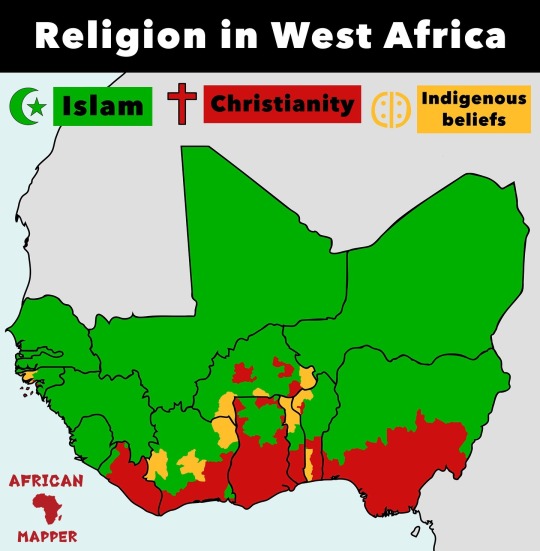
Religions in West Africa
by african.mapper
Islam is the predominant religion in West Africa, it was introduced to the region by traders in the 9th century. Islamic rules on livelihood, values, dress and practices had a profound effect on the populations and cultures in their predominant areas.
Christianity was largely introduced from the late 19th century onward, when missionaries from European countries brought the religion to the region. West African Christians are predominantly Roman Catholic and Anglican, some Evangelical churches have also been established.
Traditional African religions are the oldest belief systems among the populations of this region, and include Akan religion, Yoruba religion, Odinani-Igbo, and Serer religion. They are spiritual creeds that also perform other functions such as preserving the historical and cultural heritage of the people.
79 notes
·
View notes
Text
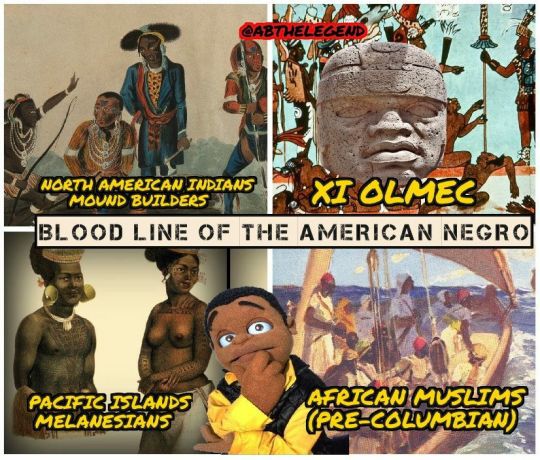
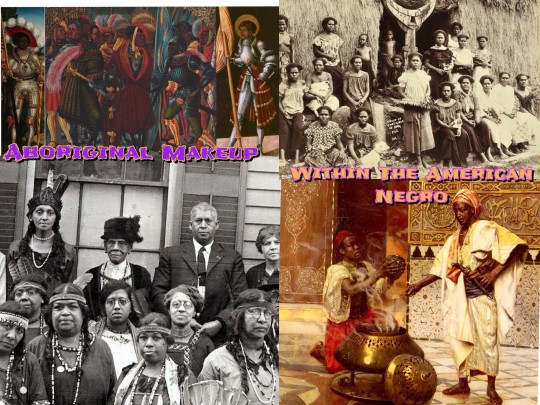



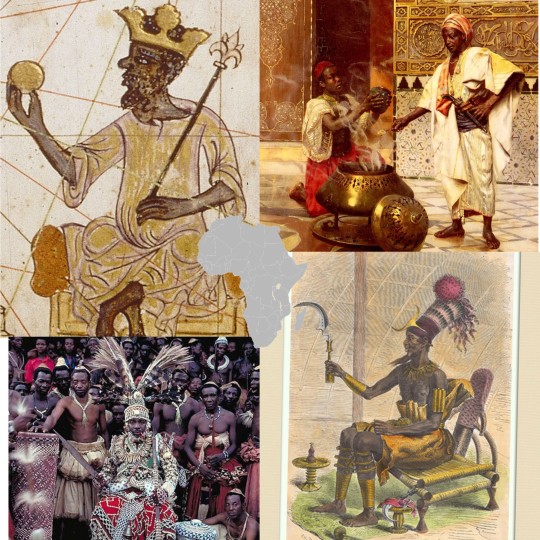
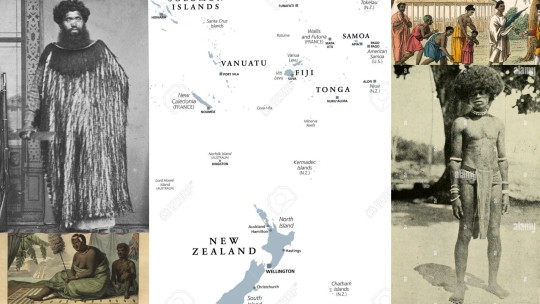

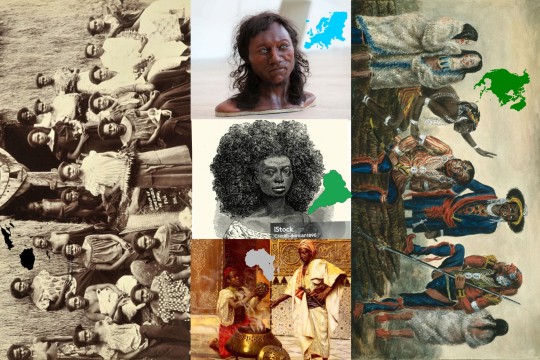
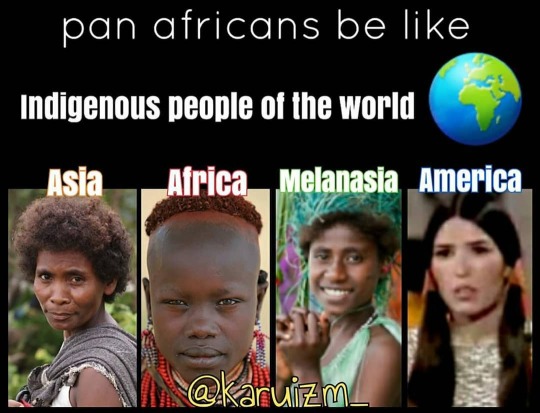
Decided to do a remake of AbTheLegend original post(1st pic) .. Us in America who descend from the indigenous people existing here Pre 👨🏻🦱 European arriving in mass/Colonization were talking amongst other groups and mixing with them as they arrived. This history is often hidden or ignored by mainstream. But luckily folks are starting to listen to them less and less😅. Hell the period of slavery also added some more of this as you may be aware of.Anyways these five main groups are Africans(North Africans,West&Central) , Pacific Islanders, South Americans , Black 👨🏿🦱Europeans and of course North Americans. Like other groups everywhere they mixed but what was important is they kept their identity/heritage. Something I amongst others is helping to revive. Me myself I call it the Through Line(See the reblog for more indepth use of what I made it mean) All being said hopefully you learned something 💯
#black history#autochthonous#aboriginal#black history month#aboriginal american#black history 365#muurs#african history#american aborigine#black culture
84 notes
·
View notes
Text
Source (Season 1 - March 12th 2022)
sambaschutte: Transforming into Roach👨🏾🍳🏴☠️ Gratitude goes to @dvidjenkins for allowing us to bring ourselves to our characters. When I met Christine Wada, costume designer extraordinaire, I told her I wanted Roach to have North-West African vibes to feature my Sahara roots. She came up with the talisman necklace and the sash around my waist✨And gave us small earrings because we’re supposed to be amateur pirates. True.☠️
When I met @nancyhennah, head of makeup (she did Lord of the Rings- no biggie), we went with these ancient Berber tattoos I had found.
The diamond on the heart is for protection, the double triangular line on my wrist symbolizes the fly for awareness and the X figure on my arm symbolizes the Cockroach for survival. And that’s what I based the character on: roaches want to stay alive at all costs, and enjoy being pests to men🪳
@coolandgroovymakeup did my make-up everyday. I sat in that chair for up to 1.5 hrs to get the tattoos on and get covered in dirt and grime🖤
@everythingolajide had the easiest job doing my hair. The longest she spent was 3 minutes😂🙏🏾
I twisted my beard into 6 little curls to symbolize the legs of a cockroach🪳👀
The shoes and filthy apron completed the look. The apron gets bloodier as the show progresses, naturally🔪☠️
I’m so grateful to our entire team of creators, writers, directors and look departments for allowing me to rep some of my heritage and love for cooking❤️
Berber pirates would sail with the Spanish and in my head, Roach became the cook and surgeon to survive (you always need a cook) and somehow ended up in the Caribbean with this lot. How long will he survive? Only more episodes will tell.....👀🏴☠️🖤
135 notes
·
View notes